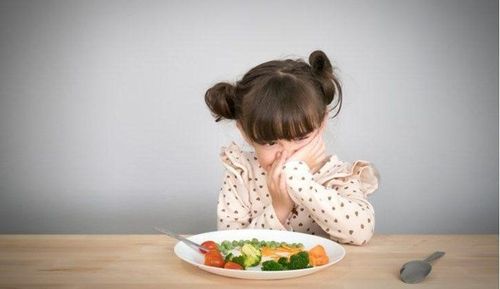This is an automatically translated article.
Anorexia is a common condition in young children and can lead to many health effects. Therefore, many parents often have the habit of forcing their children to eat as much as possible. However, from a medical point of view, is it advisable to force a child to eat and is it good to force a child to eat a lot?
1. Causes of anorexia in children
There are many reasons why children are anorexic, feel afraid of food or eat less, vomit after eating. However, in terms of science, we can point out the following 3 subjective reasons for anorexia children:
1.1. Lack of important micronutrients Deficiency of vitamins such as A, C, D and minerals such as zinc, iron, calcium... can cause children to have reduced appetite or loss of appetite. leading to anorexia.
1.2. Not fully digesting old food Many parents try to force their children to eat as much as possible but forget that the child's digestive system has not yet fully developed and is still very immature. Therefore, when you have to consume a large amount of food, it can easily lead to an indigestible state, thereby creating a feeling of fullness, bloating and anorexia.
1.3. Digestive disorders are the leading cause of anorexia in children. Some parents see that the child eats less and force the child to eat as required, but do not thoroughly understand the reason why the child is anorexic.
One of the common causes is intestinal dysbacteriosis, leading to a decrease in the ability to absorb nutrients, making children malnourished.
Besides, the digestive system disorder also leads to lack of nutrients (such as protein, essential vitamins and minerals). Since then, children have entered a vicious pathological spiral: Digestive disorders - Malnutrition - Anorexia - Malnutrition.
2. Why do parents often force their children to eat a lot? A lot of scientific evidence proves that forcing children to eat is very undesirable, and can even lead to the opposite effect such as more anorexia, bulimia or obesity when growing up.
Many parents think that they have a lot of experience in raising and know how much they need to force their children to eat. In addition, an equally important reason is that all parents want their children to develop comprehensively. All of the above leads to forcing children to eat as much as possible. However, forcing children to eat more is a different matter.

Ép trẻ ăn nhiều là một trong những sai lầm của nhiều phụ huynh hiện nay
3. Is it good to force children to eat?
Forcing a child to eat has been shown to be bad for a child's normal development. Some consequences of forcing children to eat include:
3.1. Forcing children to eat is just a swallowing reflex. Should children be forced to eat when they can't concentrate and pay attention? The answer is definitely no because the child's nature does not have to be eaten, but this action is just a swallowing reflex, which the child does unconsciously when the food is actively brought into the mouth by the parent.
Therefore, children do not have enough time and awareness to recognize the taste of food and they completely do not realize this is the time for eating and are often distracted with other fun activities. .
3.2. Forcing children to eat prevents children from discovering food by themselves Is it good for children to eat? When parents force-feeding, children will not have time to explore food by touch (touching with hands), feeling with eyes (such as seeing color, shape of food), feeling taste... As a result, the child's brain is not stimulated, there is no appetite, reduced saliva production and the end result is inefficient food digestion.
3.3. Ignoring the child's feelings Most parents assume a lot of problems and often think that they have the right to decide everything for their children (like forcing them to eat) but sometimes don't care about the baby's feelings. Parents often fear many things about their baby, the reason is because parents think that the child is too young to communicate and perform eating activities, but this view is completely wrong.
Young children from the moment of birth have a perception of danger and survival, in which being well fed is also recognized as an essential need that no child ignores. The feeling of hunger makes the child want to eat, this is a minimal survival reflex. If parents observe the baby, they will detect signs that the baby is hungry, likes or dislikes to eat, eats enough or not, feeling bored or appetizing through facial expressions, sounds (screams, squeals, etc.) eh) and actions (like shoving a spoon out of your mouth...).
The children's signs are often very clear and decisive, the problem is whether the parents find out and respect the "personal opinion" of the baby or still decide to do as they please, which is to force the child to eat as much as possible. the more the better.
Science has proven that the period when babies can sit up, neck up, hands reach to grasp, especially around 9 months old, is the time when babies can start to learn to eat on their own with the help of caregivers. .

Mỗi giai đoạn trẻ có thể ăn lượng thức ăn khác nhau, cha mẹ không nên ép trẻ ăn
4. Some harmful effects of forcing children to eat
Successfully forcing children to eat can cause children to eat too much, exceeding their needs, leading to excessive weight gain, which in turn leads to health consequences and psychological effects in the long run.
Children may suffer from "psychological trauma" because when forcing children to eat is a time when they are not happy or even tired, at this time they have to fight against their own unwillingness in many forms such as: shouting scream, cry, push food containers, run away Some other children have a mentality of compromise in a passive position and accept to give up for their parents to feed
Whatever the situation, force the child to eat when Unwanted children for a long time will make them remember the time when feeding is an unhappy time and eventually give rise to an aversion to food, as a result, older children will not like and have no appetite. that time, forcing children to eat makes them just want to finish swallowing food. This situation makes the child's teeth lose their function because they are really not used, the child only swallows without chewing, so the jaw muscles cannot develop. This also forms the habit of only trying to swallow soft foods, when parents feed harder foods, the baby does not know how to chew, leading to vomiting symptoms and creating fear for parents.
Once they understand the harmful effects of forcing children to eat, parents can consider and plan their children's meals in moderation so that children can develop comprehensively.
For children to be healthy and develop well, it is necessary to have a nutritious diet in terms of quantity and quality balance. If children are not provided with adequate and balanced nutrients, it will lead to diseases of excess or lack of nutrients, which adversely affect the comprehensive development of children in terms of physical, mental and motor skills.
Children who do not eat properly are at risk of micro-mineral deficiency causing anorexia, growth retardation, malabsorption,... If they notice the above signs, parents should supplement their children with products. The supplement contains lysine, essential micro-minerals and vitamins such as zinc, chromium, selenium, and B vitamins to help fully meet the nutritional needs of children. At the same time, these essential vitamins also support digestion, enhance nutrient absorption, help improve anorexia, and help children eat well.
Parents can learn more:
Signs of zinc deficiency in children
Micronutrient deficiency and failure to gain weight in children
Please regularly visit Vinmec.com website and update useful information to take care of your child. Take care of the baby and the whole family.













